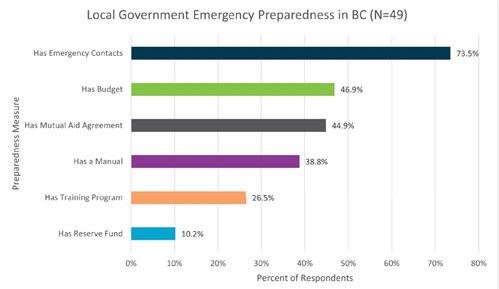Emergency Preparedness in Bc Local Governments:
Finance Officers Weigh In
Climate-related disasters and emergencies become more frequent and costly. In March 2025, the Government Finance Officers of BC (GFOABC) and CivicInfo BC surveyed BC local Governments to assess how municipalities and regional districts are planning — financially and operationally—for disaster recovery. Forty-nine local governments responded (45 municipalities and four regional districts).
KEY FINDINGS FROM THE SURVEY
- 46.9 percent of respondents have a designated budget for disaster recovery.
- Only 10.2 percent maintain a reserve fund.
- Just over a quarter (26.5 percent) report having a formal training program, while 38.8 percent have a disaster recovery manual or playbook.
- 44.9 percent have established mutual aid agreements with nearby governments or their regional district.
- The strongest showing is in emergency contact protocols, with 73.5 percent indicating they are in place.
ANALYSIS AND EMERGING THEMES
- Budgeting without reserves: While nearly half of local governments have budgeted for emergencies, most of this funding appears to be ad hoc or project based. Few have formal reserves.
- Informal arrangements dominate: Several respondents mentioned relying on informal knowledge or legacy practices. Formal documentation, training programs, or shared playbooks are less common, particularly in smaller municipalities.
- Collaboration is underway but uneven: Some governments have mutual aid agreements or service partnerships in place, but this remains an area where formal coordination could be strengthened.

CONCLUSION
The survey shows many local governments have taken initial steps toward emergency preparedness; however, there are still many opportunities. Finance professionals can play a pivotal role not only in budgeting for emergencies but also in institutionalizing preparedness through policies, agreements, and training.
The Next Quarterly Question Will be on Artificial Intelligence
Please use this link to be a contributor. This short survey should only take 3-5 minutes to complete. If you would like to contribute topics for upcoming questions, please contact office@gfoabc.ca or call (250) 382-6871.
Visit past survey results.